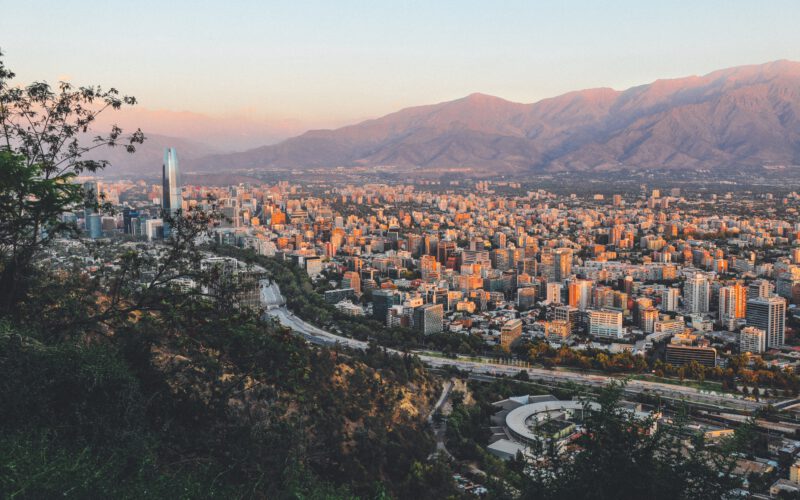In spite of its size and geographic isolation from the rest of South America, Chile, nicknamed ‘Chilecon Valley’, ranks among the top startup hubs in the region, and in 2019, it was considered Latin America’s most innovative country.
Industries such as e-commerce, m-commerce, clean energy, agtech, logistics, and fintech are increasingly becoming important sources of innovation in the country. In fact, with 44.2% mobile penetration and 82.3% of its population using the Internet, Chile has one of the fastest-growing e-commerce markets in the region.
Ranked 59th in the world for its ease of doing business, –with Mexico following shortly after in 60th place – Chile houses one of Latin America’s strongest entrepreneurial ecosystems and was arguably one of the pioneers of the region’s tech growth.
The narrow stretch of land, separated from its neighboring countries by the Andes, has a GDP of $277.1B and a population of 18M people, 7M of which are in Santiago, making it a highly centralized country. Naturally, most of Chile’s startups, investors, and accelerators are concentrated in Santiago.
Some of the country’s top investors include Nazca Mountain, Magma Partners, Manutara Ventures, Alaya Capital Partners, FounderList, NXTP Labs, Chile Global Ventures, Fen Ventures, and the most recent addition, WeBoost.
Although Chile still depends heavily on traditional industries such as mining, logging, fishing, and agriculture, the Chilean government’s economic development agency CORFO continues to show a strong interest in positioning the country as a tech hub in the region.
In 2010, the government created Startup Chile, an early-stage accelerator that encourages foreign entrepreneurs to use Chile as a launchpad, which has since helped launch over 1,600 startups. The accelerator, along with InvestChile, a government agency responsible for promoting foreign investment in the country, also launched a program called Visa Tech. The initiative helps tech companies obtain a work visa in fewer than 15 working days.
Chile was traditionally considered an oasis in Latin America due to its political stability and prosperous economy. However, in the final months of 2019, the Chilean economy was hit hard by a wave of intense protests. Millions of dollars in damages to public infrastructure and private business paralyzed the economy.
Despite the turmoil, Chile’s economy is slowly making a comeback in 2020, with an expected growth rate of 1.2% by the end of the year. Here are 10 startups to look out for as Chile’s economy recovers from the social unrest of 2019:
1. Cornershop
Cornershop is a Chilean-Mexican last-mile grocery delivery startup founded by Daniel Undurraga, Juan Pablo Cuevas, and Oskar Hjertonsson that operates in five Latin American countries, as well as in Canada. The company’s recent $450M acquisition by Uber is on standby as the Chilean government continues to investigate the transaction and how it will affect the market. However, Cornershop’s expansion throughout Latin America remains unscathed as it starts 2020 with full operations in Brazil and enters the Colombian market.
2. NotCo
NotCo is a foodtech startup that uses AI algorithms to recreate animal-based foods like mayonnaise and milk, using only plant components. The startup recently caught the attention of Jeff Bezos, who decided to make NotCo his first investment in Latin America by contributing $30M along with The Craftory, Kaszek Ventures, and Maya Capital. NotCo was also recently featured in YouTube’s ‘The Age of AI’, a docu-series hosted by Robert Downey Jr. With plans to go public by 2021, NotCo is expected to be Chile’s first unicorn. NotCo’s products can also be found in Brazil, Argentina, and the US.
3. Jooycar
Jooycar is a connected-car and user-based insurance platform seeking to disrupt the auto insurance market in Latin America. The platform informs users about maintenance checks, efficient fuel usage, and how they can improve their driving, among other features. Jooycar recently raised $3M from HCS Capital Partners and has previously raised seed capital from Magma Partners. The auto tech platform currently offers its services in Chile, Mexico, and Peru, and plans to launch in the US in 2020.
4. CryptoMKT
CryptoMKT is one of the fastest-growing cryptocurrency exchanges in Latin America. The platform connects more than 160,000 users through four digital assets: Bitcoin, Ethereum, Stellar, and EOS. In the first half of 2018, CryptoMKT raised $600K from ConsenSys Venture and Magma Partners to help expand its presence and integrate payment solutions in the region. Currently, CryptoMKT operates in Brazil, Chile, Argentina, Mexico, and Europe.
5. Fintual
Fintual is a robo-advisor that offers wealth management services through low-fee mutual funds. In 2018, Fintual became the first Chilean startup to participate in YCombinator. The fintech currently has over $57M under management from more than 8,000 users in Chile. As part of its expansion plans into Mexico, Fintual announced a partnership with Inveramerica, a Mexican investment fund manager.
6. U-Planner
U-Planner is an edtech platform that seeks to optimize and improve educational systems using AI solutions. Some of U-Planners’ services include class scheduling and developing systems to decrease student dropout rates. Founded in 2012 by Juan Pablo Mena, Carolina Arce, Cristián Espinoza, Rodrigo Hernández, and Wilibaldo Bravo, the edtech startup has since received funding from Fundación Chile and Wayra. In 2018, Scale Capital led a $5M investment in U-Planner, which has offices in Chile, Mexico, Colombia, and Peru. Over 50 globally renowned educational institutions use its programs, including the University of Washington and the University of Sydney. U-Planner also boasts strategic alliances with Microsoft, Ellucian, Telefónica, and Harvard-affiliated Laspau.
7. Destácame
Destácame is a personal finance management platform, and the first behavior-based credit score in Latin America. In 2015, Augusto Ruiz-Tagle, Jorge Camus, and Sebastian Ugarte launched the company which collaborates with more than 25 financial institutions to deliver its financial products. Destácame has offices in Chile and Mexico and provides services to over 580,000 users. Early in 2019, the fintech closed a $3M Series A funding round from Fen Ventures, Accion Venture Lab, and Mountain Nazca.
8. Lexgo
Lexgo is the first automated legal service for startups in Latin America that helps founders complete their legal processes at a much lower cost than hiring a lawyer. Founders can start a company, hire teams and advisors, create contracts with clients, and even raise rounds through Lexgo’s services. The legal tech startup, founded by Leonardo Barrientos, José Burdiles, and Juan José Figueroa, raised $10K from YCombinator to finance its expansion into Mexico. The startup currently operates in Chile, Colombia, Brazil, and the US.
9. Wheel the World
Wheel the World is a travel company for people with disabilities that creates tailored travel experiences at popular tourist destinations around the world. Founded in 2017 by Alvaro Silberstein and Camilo Navarro Bustos, the startup has raised a total of $740K from Booking Booster, Google Launchpad Accelerator, Facebook, and Startup Chile, among others. Wheel the World also recently won the Tourism Tech Adventures competition in Chile in 2019.
10. Fanatiz
Fanatiz is a streaming platform that covers live and on-demand sporting events. The startup founded by Matías Rivera in 2016, recently raised $10M Series A from Miami-based private investment firm 777 Partners. This funding will be used to expand its services globally which are currently available in Brazil, Argentina, Chile, Colombia, Peru, Bolivia, Mexico, and the US. Magma Partners previously invested an undisclosed amount in the platform.
Although Chile’s economy is off to a slow start in the wake of the 2019 protests, these circumstances could open up the playing field for startups that are able to move fast and be flexible in the Andean country’s new landscape. However, older and more traditional businesses may not be able to adapt as quickly and may take a larger blow from the aftermath of the disturbances. It will be interesting to see the opportunities that lay ahead for Chile’s ecosystem as the economy starts to pick back up.


